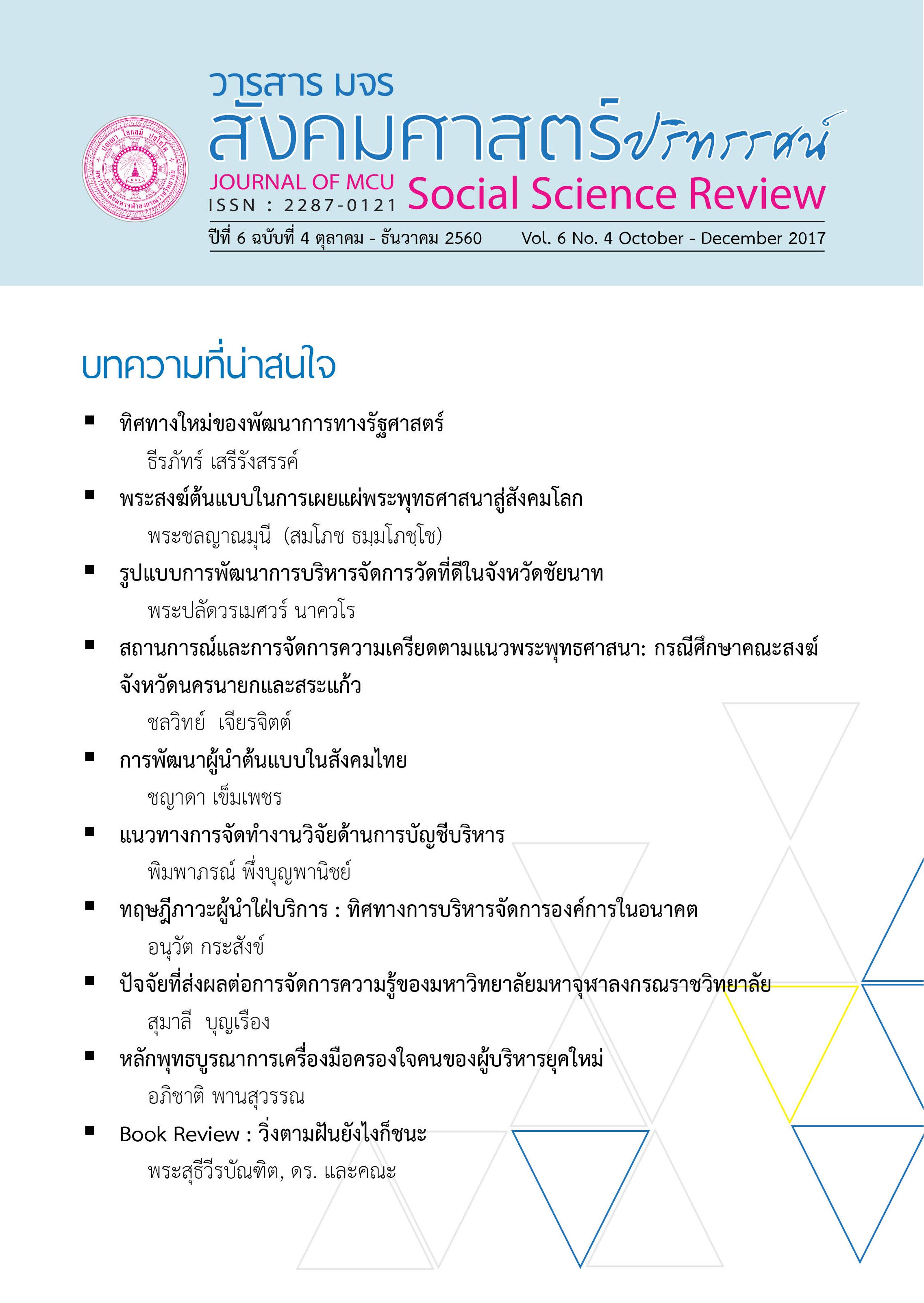การพัฒนาผู้นำต้นแบบในสังคมไทย
คำสำคัญ:
ผู้นำต้นแบบ, สังคมไทยบทคัดย่อ
บทความฉบับนี้ มีวัตถุประสงค์ 1) เพื่อศึกษาคุณลักษณะผู้นำต้นแบบในสังคมโลกโดยใช้ทฤษฎีผู้นำเชิงจิตวิญญาณเป็นทฤษฎีหลักในการอ้างอิง 2) เพื่อค้นหาองค์ประกอบคุณลักษณะและแนวทางการพัฒนาผู้นำต้นแบบในสังคมไทย และ 3) เพื่อเสนอตัวแบบผู้นำต้นแบบในสังคมไทย การวิจัยเป็นการวิจัยเชิงคุณภาพ ศึกษาข้อมูลเชิงประจักษ์จากผู้ให้ข้อมูลหลักที่เลือกแบบเจาะจงจากการสื่อผ่านภาพยนตร์ คือประธานาธิบดีเนลสัน แมนเดลา จากภาพยนตร์เรื่อง Inivictus และนางออง ซาน ซูจี จากภาพยนตร์ เรื่อง The Lady และการสัมภาษณ์เชิงลึกแบบกึ่งโครงสร้าง ผู้นำของสังคมไทยตามประเภทและการแสดงบทบาท จำนวน 25 รูป/คน วิเคราะห์ข้อมูลด้วยการวิเคราะห์เนื้อหาประกอบบริบท การวิเคราะห์แบบอุปนัย และการวิเคราะห์เปรียบเทียบ ตรวจสอบและยืนยันองค์ความรู้ด้วยการสนทนากลุ่มเฉพาะโดยผู้ทรงคุณวุฒิ จำนวน 12 รูป/คน ผลการวิจัย พบว่า 1. คุณลักษณะของผู้นำต้นแบบในสังคมโลก เป็นไปตามคุณลักษณะของผู้นำเชิงจิตวิญญาณ ได้แก่ วิสัยทัศน์ การมุ่งประโยชน์เพื่อผู้อื่น และการสร้างความหวังความศรัทธาให้กับผู้ตามในการเป็นผู้นำที่สร้างความปรองดองสมานฉันท์ให้กับสาธารณรัฐแอฟริกาใต้ และการเป็นผู้นำการต่อสู้เพื่อเรียกร้องประชาธิปไตยในสาธารณรัฐแห่งสหภาพเมียนมา 2. ผู้นำต้นแบบในสังคมไทย มีคุณลักษณะสำคัญ 10 ประการ 62 องค์ประกอบย่อย ได้แก่ การยึดหลักความพอเพียงในการดำรงชีวิต การเสียสละ การยึดหลักความถูกต้องดีงาม การสื่อสารอย่างกัลยาณมิตร การเข้าใจเทคโนโลยีสารสนเทศ การมุ่งประโยชน์เพื่อผู้อื่น การมุ่งผลสัมฤทธิ์ในการปฏิบัติงาน การเป็นแบบอย่างที่ดี การมีวิสัยทัศน์ และการสร้างความหวังความศรัทธาให้กับผู้ตาม แนวทางการพัฒนาผู้นำต้นแบบในสังคมไทย ได้แก่ การพัฒนาด้วยหลักจักร 4 หรือหลักธรรม 4 ประการที่นำบุคคลหรือนำชีวิตไปสู่ความเจริญรุ่งเรืองดุจล้อนำรถไปสู่ที่หมายในการสร้างให้สังคมไทยเป็นสังคมพรหมวิหาร ได้แก่ 1) ปฏิรูปเทสวาสะ การให้ความสำคัญกับการปลูกฝัง การอบรม บ่มเพาะตั้งแต่วัยเยาว์และการสร้างที่ที่เป็นคุณ 2) สัปปุริสูปัสสยะ การคบหาคนดี การสร้างหรือการนับถือบุคคลต้นแบบหรือบุคคลผู้สร้างแรงบันดาลใจ 3) อัตตสัมมาปณิธิ การตั้งอยู่ในสุจริต 3 คือ กายสุจริต วจีสุจริต และมโนสุจริต และ 4) ปุพเพกตปุญญตา การมีความสุขจากผลของความดีหรือการกระทำที่ดีที่ชอบ ผู้ที่ทำความดีในอดีตย่อมได้รับความสุขในปัจจุบัน 3. ตัวแบบผู้นำต้นแบบในสังคมไทย ประกอบด้วย คุณลักษณะและแนวทางการพัฒนา ตามสมการ (2S) + (3I) + (2A) + M + (SPIRIT)] + C4 = SSLM หมายถึงผู้นำจิตวิญญาณแห่งสยามหรือ SIAM-Spiritual Leader Model อธิบายได้ว่า 2S คือการยึดหลักความพอเพียงในการดำรงชีวิต (Self-Sufficiency) และการเสียสละ (Sacrifice); 3I คือการยึดหลักความถูกต้องดีงาม (Integrity) การสื่อสารอย่างกัลยาณมิตร (Integrated kalyanamitra Communication) และการเข้าใจเทคโนโลยีสารสนเทศ (Information Technology); 2A คือการมุ่งประโยชน์เพื่อผู้อื่น (Altruistic Love) และการมุ่งผลสัมฤทธิ์ในการปฏิบัติงาน (Achievement); M คือการเป็นแบบอย่างที่ดี (Modeling) และSPIRIT คือการมีวิสัยทัศน์ (Vision) และการสร้างความหวังความศรัทธาให้กับผู้ตาม (Hope/Faith) ตัวแบบผู้นำต้นแบบในสังคมไทย หรือ SIAM-Spiritual Leader Model แสดงให้เห็นคุณลักษณะของผู้นำต้นแบบในสังคมไทยที่ประกอบด้วยคุณลักษณะที่สำคัญของผู้นำเชิงจิตวิญญาณและความเป็นต้นแบบที่นำสังคมไทยไปสู่ความมั่นคงถาวร บนพื้นฐานของหลักจักร 4 ที่เป็นแนวทางการพัฒนา
เอกสารอ้างอิง
Apisada Srikhruedong. (2014). The Buddhist Approach to Development of Desirable Leadership of Women Administrators in State Universities (Doctoral Dissertation). Bangkok: Mahachulalongkornrajavathayalaya University.
Christopher S. Queen. (1996). “Introduction: The Shapes and Sources of Engaged Buddhism” Engaged Buddhism: Buddhist Liberation Movements in Asia. Edited by Christopher S. Queen and Sallie B. King. Albany: State University of New York Press.
Dusek, B.J. (1987). Adolescent Development and Behavior. Englewood Cliffs, NJ: Prentice-Hal.
Kornpat Charukamnardkanok. (2011).Human Resource Management in Philanthropic Organizations for Children and Women Social Welfare (Doctoral Dissertation). Bangkok: National Institute of Development Administration.
Nikanchala Lonlua. (2011). A Structural Equation Model of Visionary Leadership for Basic School Administrators (Doctoral Dissertation). Khon Kaen: Khon Kaen University.
Office of the Education Council. (2009). Educational Reform in The Second Decade (2009-2018). 2ndEdition. Bangkok: Office of the Education Council.
Panapong Ngammak. (2013, September-December). The Effects of the Modeling and Social Reinforcement Program for Enhancing Public Mind of Prathomsuksa 5 Students at Baan Salang Phan School in Surin Province. Journal of MCU Social Science. 2(3), 164.
Phra Brahmapundit (Prayoon Dhammacitto). (2012,September-December). How to Live happily. Journal of MCU Social Science, 1(3), 11-13.
Ralph M. Stogdill. (1974).Handbook of Leadership: A Survey of Theory and Research. New York: Free Press.
Rungroj Siriphan.(2014). Leadership Development Model Based on Buddhism (Doctoral Dissertation). Bangkok: Mahachulalongkornrajavathayalaya University.
Saksinee Emasiri. (2014). Leadership for the Future: Morality Integrity and Internal Change. Nakornpsathom: Leadership for the Future Project Mahidol University Contemplative Education Center.
Schwalb, Pamela G. (2011). Sustainability Leader Competencies: A Grounded Theory Study (Doctoral Dissertations). Student Scholarship: Agricultural Leadership, Education& Communication Department.
Suebwong Kalawong. (2011). Strategic leadership Competency Model for Mayor of the Tambon Administrative Organization (Doctoral Dissertation). Bangkok: National Institute of Development Administration.
Suthasinee Manyat. (2011). A Structural Equation Model of Factors Affecting Ethical Leadership of School Administration Under the Department of Local Administration (Doctoral Dissertation). Khon Kaen: Khon Kaen University.
Virachai Ananthean. (2013). THE Strategy of the Ethical Development for Thai Juveniles (Doctoral Dissertation). Bangkok: Mahachulalongkornrajavathayalaya University.
ดาวน์โหลด
รูปแบบการอ้างอิง
ฉบับ
ประเภทบทความ
สัญญาอนุญาต
ลิขสิทธิ์ (c) 2017 วารสาร มจร สังคมศาสตร์ปริทรรศน์

อนุญาตภายใต้เงื่อนไข Creative Commons Attribution-NonCommercial-NoDerivatives 4.0 International License.
เพื่อให้เป็นไปตามกฎหมายลิขสิทธิ์ ผู้นิพนธ์ทุกท่านต้องลงลายมือชื่อในแบบฟอร์มใบมอบลิขสิทธิ์บทความให้แก่วารสารฯ พร้อมกับบทความต้นฉบับที่ได้แก้ไขครั้งสุดท้าย นอกจากนี้ ผู้นิพนธ์ทุกท่านต้องยืนยันว่าบทความต้นฉบับที่ส่งมาตีพิมพ์นั้น ได้ส่งมาตีพิมพ์เฉพาะในวารสาร มจร สังคมศาสตร์ปริทรรศน์ เพียงแห่งเดียวเท่านั้น หากมีการใช้ภาพหรือตารางหรือเนื้อหาอื่นๆ ของผู้นิพนธ์อื่นที่ปรากฏในสิ่งตีพิมพ์อื่นมาแล้ว ผู้นิพนธ์ต้องขออนุญาตเจ้าของลิขสิทธิ์ก่อน พร้อมทั้งแสดงหนังสือที่ได้รับการยินยอมต่อบรรณาธิการ ก่อนที่บทความจะได้รับการตีพิมพ์ หากไม่เป็นไปตามข้อกำหนดเบื้องต้น ทางวารสารจะถอดบทความของท่านออกโดยไม่มีข้อยกเว้นใดๆ ทั้งสิ้น





